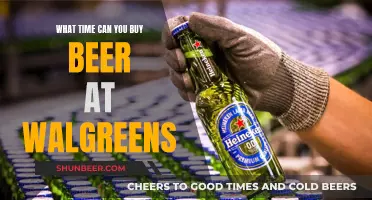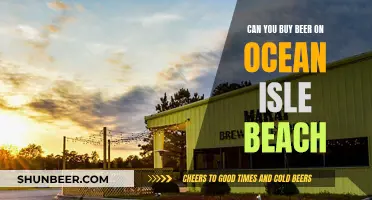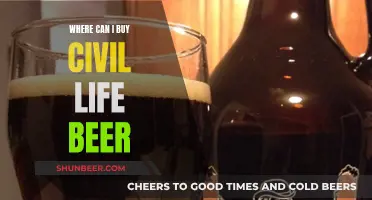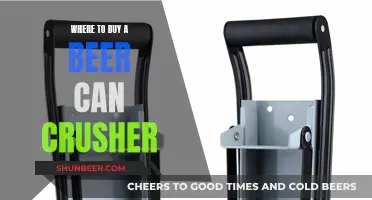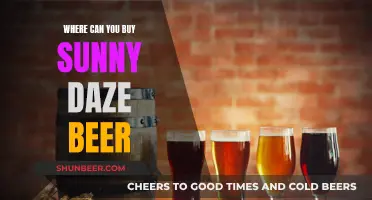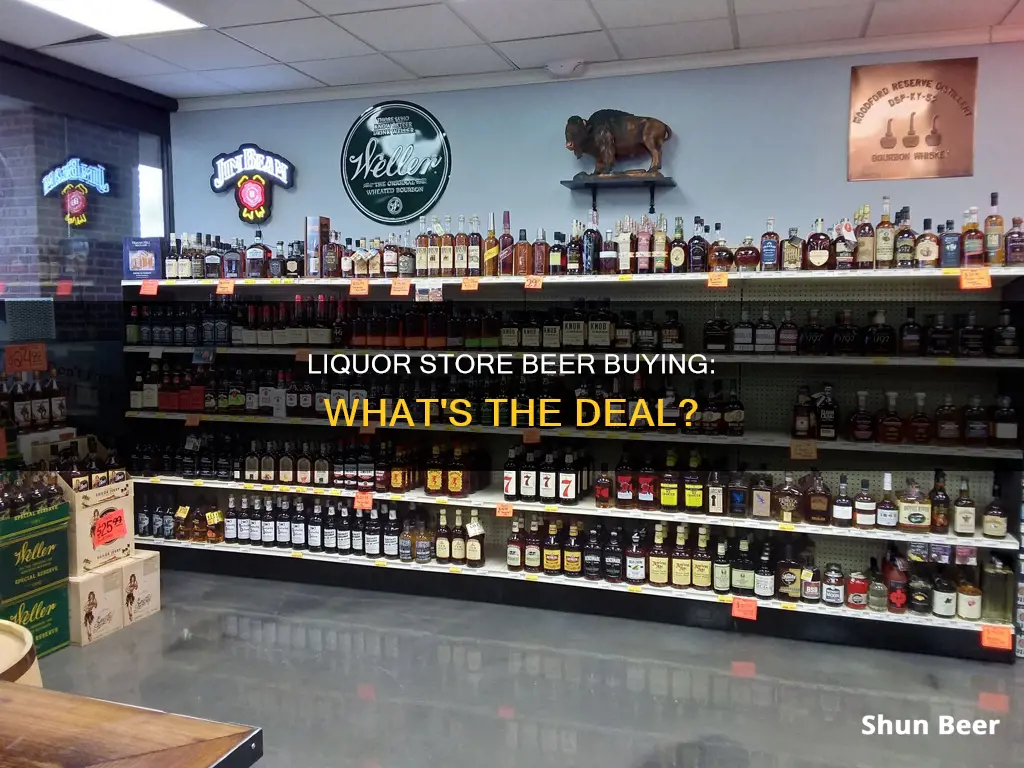
The Twenty-first Amendment to the United States Constitution grants each state and territory the power to regulate intoxicating liquors within their jurisdiction. As a result, the laws governing the production, sale, distribution, and consumption of alcohol differ significantly across the country. For instance, in California, beer, wine, and liquor are all available at grocery shops, but in other states, beer may be purchased at a supermarket, but wine and spirits must be purchased at a separate liquor shop. In Utah, alcoholic beverages can only be bought at state-run facilities.
What You'll Learn

Beer, wine, and liquor: Availability across different states in the US
The Twenty-first Amendment to the United States Constitution grants each state and territory the power to regulate intoxicating liquors within their jurisdiction. As such, laws pertaining to the production, sale, distribution, and consumption of alcohol vary significantly across the country.
Alabama
Beer and wine are not controlled by the state, but spirits are. On and off-premise liquor sales are limited to 2 am on Sundays. Beer and wine can be sold in supermarkets, but spirits cannot. There is a 6% ABV cap on beer sales, and bottles cannot exceed 16 oz. Wine also faces a 14.9% ABV limit. Homebrewing is currently illegal in Alabama.
Alaska
No alcohol is state-controlled in Alaska. On and off-premise sales are from 8 am to 5 am. Liquor sales are not allowed in grocery stores.
Arizona
No alcohol is state-controlled in Arizona. Sales are permitted from 6 am to 2 am Monday to Saturday, and 10 am to 2 am on Sunday. Drive-through liquor stores are legal.
Arkansas
Distribution is not state-controlled in Arkansas. On-premise sales vary with Class A Private Clubs able to serve from 7 am to 2 am, Class B from 10 am to 5 am, and restaurants from 7 am to 1 am. Off-premise sales are allowed from 7 am to 1 am Monday to Friday, but only until midnight on Saturdays. Beer and wine can be sold in supermarkets, but only in-state-produced wine is allowed, and spirits are not. Arkansas has many dry counties, but private clubs are exempt from this. Sunday and Christmas Day sales are prohibited (with some exceptions).
California
Sales are not controlled by the state in California. Sales are allowed from 6 am to 2 am. Wine, beer, and spirits are permitted to be sold in grocery stores. California has lenient laws about liquor promotion, but counties can restrict sales with local laws. The sale of alcohol above 76.5% ABV is illegal.
Colorado
Sales are not controlled by the state in Colorado. On-premise sales are allowed from 7 am to 2 am, and off-premise sales from 8 am to midnight. Only 3.2% ABV beer can be sold in grocery stores. As of July 1, 2008, off-premise sales are allowed 7 days a week. Liquor stores are only allowed to operate one location, and absinthe is legal.
Connecticut
Sales are not controlled by the state in Connecticut. On-premise sales are allowed from 9 am to 1 am Monday to Thursday, and 9 am to 2 am Friday to Saturday. Off-premise sales are allowed from 8 am to 9 pm Monday to Saturday. Off-premise sales are not permitted on Sundays or holidays. Beer can be sold in grocery stores.
The Best Places to Buy Coors Non-Alcoholic Beer
You may want to see also

State-specific laws governing beer sales at liquor stores
In the United States, the 21st Amendment grants each state and territory the power to regulate intoxicating liquors within their jurisdiction. As such, laws pertaining to the production, sale, distribution, and consumption of alcohol vary significantly across the country.
Alabama
Beer and wine are not controlled by the state, but spirits are. On and off-premise liquor sales are limited to 2 am on Sundays. Beer and wine can be sold in supermarkets, but spirits cannot. There is a 6% ABV cap on beer sales, and bottles cannot exceed 16 oz. Wine also faces a 14.9% ABV limit. Homebrewing is currently illegal in Alabama.
Alaska
No alcohol is state-controlled in Alaska. On and off-premise sales are from 8 am to 5 am. Liquor sales are not allowed in grocery stores.
Arizona
No alcohol is state-controlled in Arizona. Sales are permitted from 6 am to 2 am Monday to Saturday, and 10 am to 2 am on Sunday. Drive-through liquor stores are legal.
Arkansas
Distribution is not state-controlled in Arkansas. On-premise sales vary depending on the type of establishment. Off-premise sales are allowed from 7 am to 1 am Monday to Friday, but only until midnight on Saturdays. Beer and wine can be sold in supermarkets, but only in-state-produced wine is permitted, and spirits are prohibited. Arkansas has many dry counties, but private clubs are exempt from this. Sunday and Christmas Day sales are prohibited (exceptions apply).
California
Sales are not controlled by the state in California. Sales are allowed from 6 am to 2 am. Wine, beer, and spirits are permitted to be sold in grocery stores. California has lenient laws about liquor promotion, but counties can restrict sales with local laws. The sale of alcohol 76.5% ABV or higher is illegal.
Colorado
Sales are not controlled by the state in Colorado. On-premise sales are allowed from 7 am to 2 am, and off-premise sales from 8 am to midnight. Only 3.2% ABV beer can be sold in grocery stores. As of July 1, 2008, off-premise sales are allowed seven days a week. Liquor stores are only allowed to operate one location, and absinthe is legal.
Connecticut
Sales are not controlled by the state in Connecticut. On-premise sales are allowed from 9 am to 1 am (Monday to Thursday) and 9 am to 2 am (Friday to Saturday). Off-premise sales are permitted from 8 am to 9 pm (Monday to Saturday). Off-premise sales are not allowed on Sundays or holidays. Beer can be sold in grocery stores.
Buying Beer in North Carolina: Grocery Store Guide
You may want to see also

Age restrictions for buying beer at liquor stores
The age restrictions for buying beer at liquor stores vary across the United States. The Twenty-first Amendment to the United States Constitution grants each state and territory the power to regulate intoxicating liquors within their jurisdiction. As such, laws pertaining to the sale of alcohol differ significantly across the country.
On July 17, 1984, the National Minimum Drinking Age Act was enacted, which required all states to set a minimum age of 21 years for purchasing and possessing alcohol in public. However, this Act does not restrict drinking or possessing alcohol in private, and some states allow those under 21 to drink in certain circumstances, such as for religious purposes or when accompanied by a parent or guardian.
The minimum age to buy beer at liquor stores depends on the specific state and its laws. For example:
- In Alaska, only those aged 21 or older may sell or serve beer, wine, or spirits.
- In Arizona, persons aged 16 or older may sell beer, wine, or spirits in an off-site store, as long as a supervisor aged 19 or older is present.
- In California, there is no minimum state age to sell beer or wine in a store for off-site consumption, but a manager must be present.
- In Connecticut, the state permits adults of any age to sell alcohol for off-site consumption, with no distinction between beer, wine, or spirits.
- In Florida, there is no minimum state age to sell beer or wine for off-site consumption, but employees must be aged 18 or older to sell spirits.
- In Georgia, there is no minimum age to sell beer, wine, or spirits for off-site consumption.
- In Hawaii, adults aged 19 or older may sell beer, wine, and spirits at off-site stores.
- In Idaho, adults aged 19 or older may sell beer, wine, and spirits at off-site stores.
- In Illinois, the state law permits adults aged 18 or older to sell alcohol for off-site consumption, with no distinction between different types of alcoholic beverages.
Therefore, it is important to check the specific laws and regulations of each state when it comes to age restrictions for buying beer at liquor stores. These laws can vary widely, and it is the responsibility of individuals to be aware of and comply with the relevant regulations in their state.
Buying Beer on Sundays in Maryland: Is it Legal?
You may want to see also

Differences between beer sold at grocery stores and liquor stores
The differences between beer sold at grocery stores and liquor stores vary depending on the state. In some states, such as Virginia, supermarkets can sell wine, beer, and liquor, while in others, like New York, they can only sell beer. In California, for instance, all alcohol is typically cheaper at supermarkets than at liquor stores because it is bought in bulk. However, liquor stores may be more convenient depending on the neighborhood, and they often sell other items that supermarkets can't, like cigarettes.
Liquor stores generally sell only alcohol and sometimes cheese or snacks to accompany the drinks. They have a much bigger selection of alcoholic beverages than grocery stores. In some states, like Utah, liquor laws are stricter, and only beer with less than 3.2% alcohol content can be purchased at grocery stores and gas stations, while wine, vodka, and stronger beer are sold exclusively in state-owned liquor stores.
Buying Beer Early on a Saturday Morning
You may want to see also

Temporary licences for selling beer at special events
Private Parties:
Private parties that meet certain criteria are generally exempt from obtaining a licence to serve alcohol. A private party is defined as an event that is not open to the public, with a guest list restricting access only to invited guests. The host provides and furnishes all the alcohol for the event at their expense, and there are no fees associated with attendance or alcohol consumption. There is also no cash bar or other similar arrangements where attendees pay for their drinks.
One-Day Events:
For one-day events, you will typically need to obtain a special event permit, such as the "ABC Event Permit" (ABC 218) in California. This permit allows alcohol to be served at non-private special events. To obtain this permit, you must hire a catering company licensed with the Alcoholic Beverage Commission (ABC) and submit the request and permit fee at least 10 days before the event. You can purchase the alcohol separately, but the catering company will be responsible for serving it.
Non-Profit Organisations:
Non-profit organisations can usually apply for a special occasion licence to sell beer, wine, and spirits at a specified date, time, and place. This type of licence often comes with certain restrictions, such as a limit on the number of events per year. The licence may also require that all alcohol is sold and not given away, and that proceeds from alcohol sales go directly back to the non-profit organisation. Applications for this type of licence typically need to be submitted well in advance of the event, and there may be additional requirements, such as mandatory alcohol server training.
Location-Specific Regulations:
It is important to note that regulations regarding temporary licences for selling beer at special events can vary by location. For example, in Washington, a special occasion licence is only available to non-profit organisations registered with the Washington Secretary of State or the IRS. In California, certain types of licensees can apply for an event permit, which allows them to sell alcoholic beverages on property adjacent to their licensed premises for no more than four days per calendar year. Therefore, it is essential to check the specific regulations in your area before planning an event involving alcohol sales.
Buying Beer in Virginia on Sundays: What's the Deal?
You may want to see also
Frequently asked questions
Yes, but only beer with a low alcohol content (3.2%) can be sold in Minnesota supermarkets.
Yes, you can buy beer, wine, and liquor at grocery stores in California.
Alcoholic beverages can only be purchased at state-run facilities in Utah.


